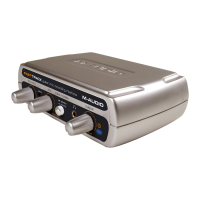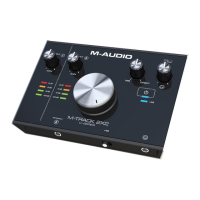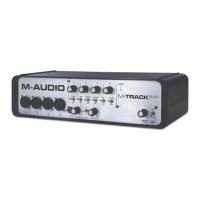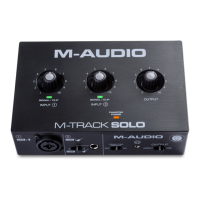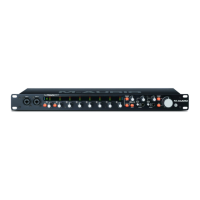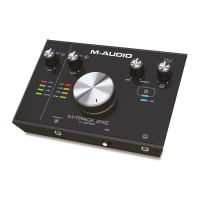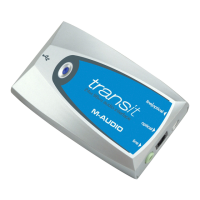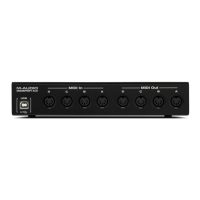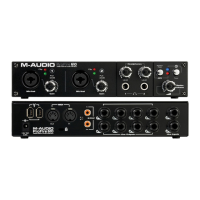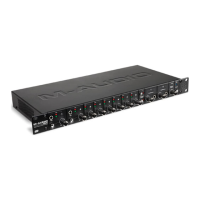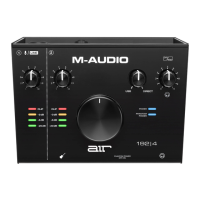Do you have a question about the M-Audio Fast Track C600 and is the answer not in the manual?
Details the key features and capabilities of the Fast Track C600 audio interface, including inputs, outputs, and connectivity.
Outlines the necessary hardware and software requirements for operating the Fast Track C600, including compatible operating systems.
Explains the symbols and formatting conventions used throughout the user guide to highlight important information.
Provides information and links to the official Avid website for product support, downloads, and company news.
Describes the controls and indicators located on the top panel of the Fast Track C600, such as gain knobs, meters, and buttons.
Details the ports and connectors found on the back panel of the Fast Track C600, including power, USB, MIDI, and audio connections.
Explains the controls and connectors on the front panel of the Fast Track C600, specifically the instrument inputs and headphone outputs.
Provides step-by-step instructions for installing the necessary drivers for the Fast Track C600 on both Mac and Windows operating systems.
Guides users on how to connect headphones to the Fast Track C600 and control their volume levels.
Explains how to connect powered speakers, home stereos, or mixers to the line outputs of the Fast Track C600.
Details how to connect various audio sources like microphones, guitars, and keyboards to the analog inputs of the Fast Track C600.
Specific instructions for connecting microphones, including phantom power requirements and XLR connections.
Guides on connecting instruments, distinguishing between DI and Line inputs, and setting up for guitars, basses, keyboards, and mixers.
Explains how to connect MIDI devices to the Fast Track C600 for recording and editing MIDI tracks.
Describes how to load and save settings files (presets) for the Fast Track C600 Driver Control Panel to manage configurations.
Explains the different display layouts (Horizontal, Vertical) available in the Driver Control Panel for managing interface parameters.
Covers additional features accessible via the Control Panel, including Setup, Flow, and About sections.
Details the functionality of the monitor mixer for creating custom cue mixes for performers during recording.
Provides guidance on navigating and using the various sections of the monitor mixer, including hardware inputs, software returns, and effects.
Explains how to configure the Multi and Transport buttons to emulate keyboard shortcuts for software control.
Defines macros and provides examples of programming multi-step sequences for the Multi button.
Provides instructions on assigning single key commands or keyboard shortcuts to the transport control buttons.
Guides users through the process of recording audio tracks using the Fast Track C600, including input selection and gain setup.
Explains how to record virtual instrument or MIDI tracks using the Fast Track C600 with MIDI controllers.
Provides steps to verify USB connections, power, and signal presence when experiencing audio issues with the Fast Track C600.
Guides users on verifying driver installation and troubleshooting driver-related issues for the Fast Track C600.
Offers advice on configuring music software settings, including ASIO/Core Audio drivers and output routing, for the Fast Track C600.
Advises on checking for compatible drivers before installing operating system updates to ensure proper device functionality.
Lists important information to gather before contacting Avid support to facilitate faster problem resolution.
Provides information on the proper disposal of waste electrical and electronic equipment in the European Union.
Declares compliance with FCC and other regulations regarding electromagnetic emissions and immunity.
Details safety certifications and standards met by the Fast Track C600, including warnings for electrical shock.
States compliance with Australian regulatory standards for digital apparatus and interference-causing equipment.
Confirms adherence to Canadian Interference-Causing Equipment Regulations for Class B digital devices.
Lists critical safety precautions and guidelines for the proper and safe use of the equipment.
| Brand | M-Audio |
|---|---|
| Model | Fast Track C600 |
| Category | Accessories |
| Language | English |
